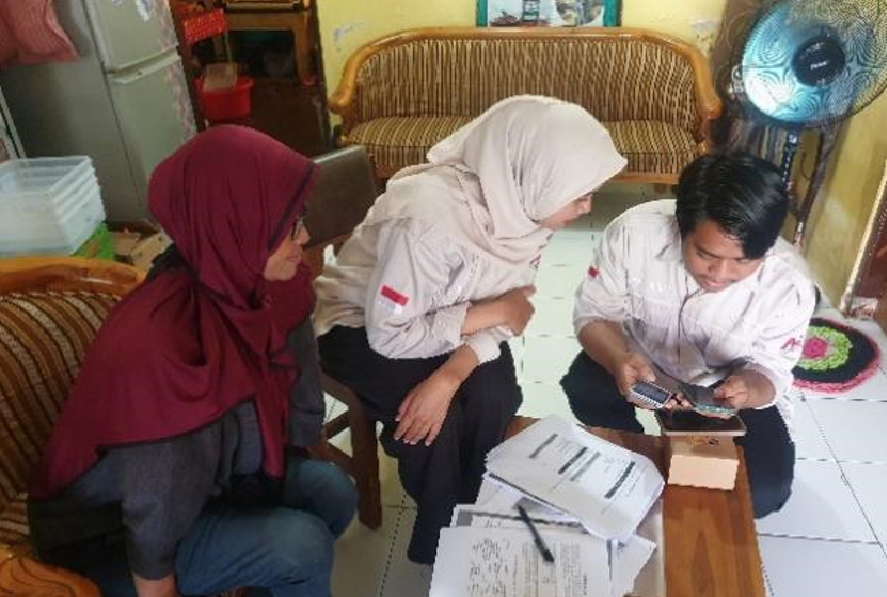Peningkatan Kualitas Manajemen Keuangan Menggunakan Aplikasi Android Pada Usaha Mikro Kecil dan Menengah Ima Food
Main Article Content
Abstract
The PKM activity partner is Ima Food, which is located in Purwomartani Village, Kalasan, Sleman, D.I. Yogyakarta. The primary issue that partners deal with is that they continue to mix up personal and business finances. This is motivated by a lack of skills and the media used to record business financial reports. Do not have Financial Reports because financial records are not optimal. To overcome partner problems, the PKM team offers the following solutions: (1) Financial literacy education related to MSME Financial Management; (2) Assistance using the android application “Akuntansi UKM†to facilitate recording and preparing financial reports. This PKM implementation method uses Participatory Learning and Action (PLA) theory. Some of the steps taken are planning, implementation, monitoring and evaluation. The result of this activity is that Ima Food has financial reports that comply with established standards. Through financial reporting using the Aplikasi UKM, partners can calculate the cost of goods sold based on their expenses, not based on the market selling price. This will certainly provide added value to business activities, increase business enthusiasm and expand business capital.
Article Details

Jurnal Pemberdayaan Masyarakat is licensed under a Creative Commons Attribution 4.0 International License.
References
Darmawan, D., Alamsyah, T. ., & Rosmilawati, I. (2020). Participatory Learning and Action untuk Menumbuhkan Quality of Life pada Kelompok Keluarga Harapan di Kota Serang. Journal of Nonformal Education and Community Empowerment, 4(2), 160–169. https://doi.org/10.15294/pls.v4i2.41400
Fathah, R. N., & Hafni, D. A. (2023). Pelatihan Pelaporan Keuangan Pada Kelompok Umkm Giri Sembada Desa Girikerto Kecamatan Turi Kabupaten Sleman. Community Development Journal, 4(2), 2325–2333.
Fathah, R. N., & Safitri, T. A. (2020). Pelatihan Pelaporan Keuangan Sederhana dan Manajemen Keuangan Bagi UMKM yang Terdaftar di Bank Wakaf Mikro UNISA. Jurnal Ilmiah Pangabdhi, 6(2), 73–77. https://doi.org/10.21107/pangabdhi.v6i2.7538
Febrianty, F., Annisa, M. L., Pratiwi, Y. N., Putri, T., Utami, P., & Lestari, E. (2022). Pelatihan dan Pendampingan Pengelolaan Keuangan Usaha dan Pemanfaatan Aplikasi Akuntansi UKM. Jurnal Pengabdian Kepada Masyarakat, 2(4), 229–237. https://doi.org/10.35912/yumary.v2i4.1226
Gilang, A., & Fathah, R. N. (2022). ANALISIS PENERAPAN SAK ETAP PADA USAHA MIKRO KECIL DAN MENENGAH ( UMKM ) ( Studi Kasus Pada Hostel Sleepinnbox di Yogyakarta ). Jurnal Ekonomi Dan Pariwisata (DIMENSI), 4(1), 41–56.
Hafni, D. A., & Rahmawati, F. M. (2020). Aksesibilitas Permodalan Perbankan bagi Wirausahawan Difabel di D.I Yogyakarta untuk Mewujudkan Ekonomi Inklusi. Kompartemen: Jurnal Ilmiah Akuntansi, 17(2), 130–141. https://doi.org/10.30595/kompartemen.v17i2.3629
Hanifah, et. a. (2022). Teknik Pemasaran dan Pengelolaan Sistem Keuangan pada UMKM Rosalia (Olahan Salak) di Era Pandemic Covid-19. Jurnal Pemberdayaan Masyarakat, 7(1), 840–846.
Nindiasari, A. D., Hafni, D. A., & Segarawasesa, F. S. (2021). Pelatihan Kewirausahaan Bagi Kader Nasyiatul Aisyiyah Untuk Meningkatkan Kemandirian Ekonomi Perempuan Di Masa Pandemi Covid-19. MONSU’ANI TANO Jurnal Pengabdian Masyarakat, 4(2), 109. https://doi.org/10.32529/tano.v4i2.1025
Pahlevi, R. W., Retnaningdiah, D., Kurnianingsih, R., Prasojo, E., & Samsudin, M. A. (2012). A Systematics Literature Review of SMEs Entrepreneurial Orientation: Bibliometric Analysis. Management Analysis Journal, 1(2), 120–128.
Rohmadani, Z. V., Nindiasari, A. D., Segarawasesa, F. S., & Winarsih, T. (2022). SEMANGAT: Realizing a healthy, independent, enterprising and optimistic community at LKSA Muhammadiyah Nanggulan Orphanage, Kulon Progo. Community Empowerment, 7(12), 2030–2038. https://doi.org/10.31603/ce.6932

